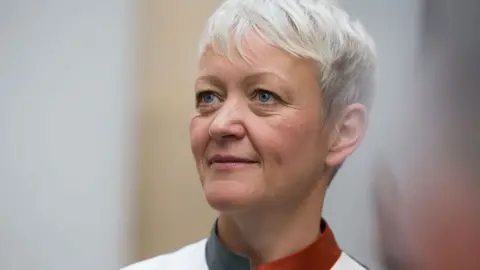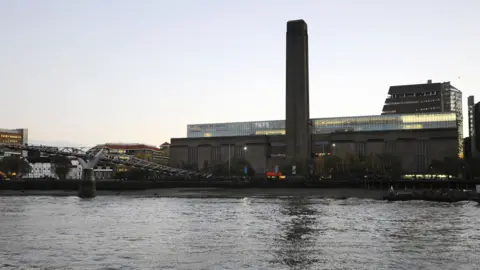Why the Tate's new boss needs to grasp the nettle
 AFP/Getty
AFP/GettyMaria Balshaw wants to make the Tate "the most culturally inclusive institution in the world", which she thinks it is far from being at the moment.
"We are about a third of the way down the road," she says.
Having been one the major players behind Manchester's recent cultural renaissance, she takes on the leadership of the Tate with palpable energy and ambition.
Her intention, she says, is to change the Tate in the next 20 years as much as her predecessor - Sir Nicholas Serota - changed it in the last two decades.
Given that he oversaw the transformation of the museum from a respected gallery in Pimlico (with a regional outlet in Liverpool) into a global mega art brand, it is a bold claim.
'A big shift'
Sir Nicholas built his Tate empire with bricks and mortar, refurbishing existing galleries and creating new venues such as Tate Modern. Balshaw will take a different approach with her expansionist agenda, focussing more on people rather than real estate.
Roughly speaking, according to statistics collected by the newly-renamed Department of Digital, Culture, Media & Sport, around 50% of the British population visit a museum or gallery at least once a year, meaning - of course - 50% do not. These absentees are her target audience.
She says: "We should absolutely reasonably expect 75% of the population to love the fact we have a national collection and feel happy to be visiting Tate… and every young person should be given the opportunity to think and play and experiment in the spaces Tate holds. And that is a big, big shift."
 PA
PAHer clarity of vision is impressive, but her ability to explain how it will be realised is less exact. She wants to usher in "an easier language to talk about the joy of art" but couldn't be specific beyond saying that arcane words should be either avoided or explained.
She talks of a radical transformation in audience profile, of a lack of representation of people from BAME background among the staff and in the sector more generally. But when it comes to the organisation she is now leading, which is to be the agent for the change she desires, she says, "it's not that we need to change anything particularly".
There is no doubt she is sincere in her ambitions, and probably more capable than most in the museum and gallery world when it comes to broadening the audience.
But if she is to be successful in her aims she will need to take a leaf out of Sir Nicholas's job application for the Tate director's job back in the 1980s - in which he wrote that for the institution to change he would need to grasp the nettle.

Follow us on Facebook, on Twitter @BBCNewsEnts, or on Instagram at bbcnewsents. Follow my Twitter feed: @WillGompertzBBC If you have a story suggestion email entertainment.news@bbc.co.uk.